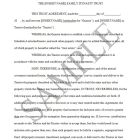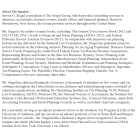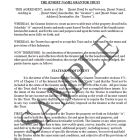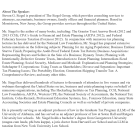Spousal Lifetime Access Non-Grantor Trust (SLANT) (32 Pages)
SPOUSAL LIFETIME ACCESS NON-GRANTOR TRUST (SLANT)
Necessary Clause
In order for a SLANT to be a non-grantor trust, it is imperative that there be one or more adverse parties who must consent to distributions to the grantor’s spouse. By definition, an adverse party is any person having a substantial beneficial interest in the trust that would be adversely affected by the exercise or non-exercise of the power he or she holds with respect to the trust. See I.R.C. § 672(a).
This typically requires a child as beneficiary (in this trust) to be required to consent. If desired, other persons could be given a “substantial” beneficial interest in the trust (siblings?) to increase the number of adverse parties, if desired. Trustees, as such, are not adverse parties. Neither is the spouse of the grantor.
Reasons For A SLANT
Some advantages of the SLANT over the more commonly used SLAT include:
- If a SLAT has been or will be used, the SLANT is different, so the reciprocal trust concerns surrounding SLATs can be avoided.
- Use of a SLANT separate from the SLAT (which is a grantor trust) that holds real estate, should generate an “extra” state and local tax deduction in light of the SALT limitation.
- A SLANT involved in business activity may qualify for the QBI deduction separate from the grantor.
- The SLANT’s business activity may qualify for the Qualified Small Business Stock exclusion under IRC 1202.
- The SLANT’s business activity may allow income to avoid the net investment income tax under IRC 1411.
- As a non-grantor trust, a SLANT may take advantage of the unlimited charitable deduction under IRC 642(c).
- Creditor protection may be enhanced.
- State income taxes may be avoided if the SLANT is drafted as an Incomplete Non-Grantor Trust (ING).
- If new legislation makes grantor trusts includable in the grantor’s estate, the SLANT will avoid that characterization.
Disadvantages Of A SLANT
- A dependency on identification and actions of adverse parties may limit distributions.
- If income not distributed to individual beneficiaries, it will be taxed at the compressed (unfavorable) income tax rates.
SPOUSAL LIFETIME ACCESS NON-GRANTOR TRUST (SLANT)
Necessary Clause
In order for a SLANT to be a non-grantor trust, it is imperative that there be one or more adverse parties who must consent to distributions to the grantor’s spouse. By definition, an adverse party is any person having a substantial beneficial interest in the trust that would be adversely affected by the exercise or non-exercise of the power he or she holds with respect to the trust. See I.R.C. § 672(a).
This typically requires a child as beneficiary (in this trust) to be required to consent. If desired, other persons could be given a “substantial” beneficial interest in the trust (siblings?) to increase the number of adverse parties, if desired. Trustees, as such, are not adverse parties. Neither is the spouse of the grantor.
Reasons For A SLANT
Some advantages of the SLANT over the more commonly used SLAT include:
- If a SLAT has been or will be used, the SLANT is different, so the reciprocal trust concerns surrounding SLATs can be avoided.
- Use of a SLANT separate from the SLAT (which is a grantor trust) that holds real estate, should generate an “extra” state and local tax deduction in light of the SALT limitation.
- A SLANT involved in business activity may qualify for the QBI deduction separate from the grantor.
- The SLANT’s business activity may qualify for the Qualified Small Business Stock exclusion under IRC 1202.
- The SLANT’s business activity may allow income to avoid the net investment income tax under IRC 1411.
- As a non-grantor trust, a SLANT may take advantage of the unlimited charitable deduction under IRC 642(c).
- Creditor protection may be enhanced.
- State income taxes may be avoided if the SLANT is drafted as an Incomplete Non-Grantor Trust (ING).
- If new legislation makes grantor trusts includable in the grantor’s estate, the SLANT will avoid that characterization.
Disadvantages Of A SLANT
- A dependency on identification and actions of adverse parties may limit distributions.
- If income not distributed to individual beneficiaries, it will be taxed at the compressed (unfavorable) income tax rates.
Author:
Steven G. Siegel is president of The Siegel Group, a Morristown, New Jersey - based national consulting firm specializing in tax consulting, estate planning and advising family business owners and entrepreneurs. Mr. Siegel holds a BS from Georgetown University, a JD from Harvard Law School and an LLM in Taxation from New York University.
He is the author of several books, including: Planning for An Aging Population; Business Entities: Start to Finish; Taxation of Divorce and Separation; Income Taxation of Estates and Trusts, Preparing the Audit-Proof Federal Estate Tax Return, Putting It Together: Planning Estates for $5 million and Less, Family Business Succession Planning, Business Acquisitions: Representing Buyers and Sellers in the Sale of a Business; Dynasty Trusts; Planning with Intentionally-Defective Grantor Trusts; The Federal Gift Tax: A Comprehensive Analysis; Charitable Remainder Trusts, Grantor Trust Planning: QPRTs, GRATs and SCINs, The Estate Planning Course, The Retirement Planning Course, Retirement Distributions: Estate and Tax Planning Strategies; The Estate Administration Course, Tax Strategies for Closely-Held Businesses, and Tort Litigation Settlements: Tax and Financial Issues.
Mr. Siegel has lectured extensively throughout the United States on tax, business and estate planning topics on behalf of numerous organizations, including National Law Foundation, AICPA, CCH, National Tax Institute, National Society of Accountants, and many others. He has served as an adjunct professor of law at Seton Hall and Rutgers University law schools.
The Siegel Group provides consulting services to accountants, attorneys, financial planners and life insurance professionals to assist them with the tax, estate and business planning and compliance issues confronting their clients. Based in Morristown, New Jersey, the Group has provided services throughout the United States. The Siegel Group does not sell any products. It is an entirely fee-based organization.
-
 Spousal Lifetime Access Trust (SLAT) (30 Pages)Special Price $129.00 Regular Price $159.00
Spousal Lifetime Access Trust (SLAT) (30 Pages)Special Price $129.00 Regular Price $159.00 -
 Dynasty Trust (34 Pages)$129.00
Dynasty Trust (34 Pages)$129.00




